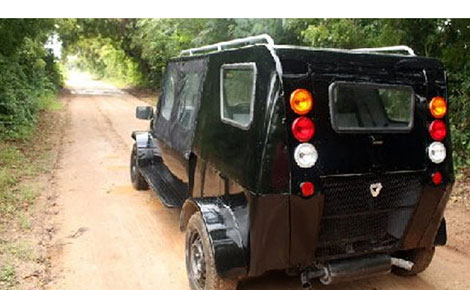 |
|
Mobius |
On the edge of Kenya's capital, two doors down from a gleaming display of Germany's luxury Porsche cars, another showroom offers Africa's answer to the continent's potholed roads.
It's called the Mobius. It has no flashy dials, alloy wheels or electric windows. In fact it has no windows at all except for the front windshield.
Instead, the square car-cum-pickup with its aluminium panels has been stripped of extras to make it sturdy and cheap.
"We are not trying to reinvent the wheel, we are just trying to make ... one that is a bit tougher," says sales manager Aman Ghai in the showroom, where engineers are also at work.
Mobius Motors hopes to succeed where many others have failed: designing, building and selling a product in Africa, which has long provided the raw materials to feed the world's factories but struggled to create a manufacturing base at home.
Mobius faces prodigious challenges, not least a popular perception that Africa can't produce a quality product on its own.
It has also had to weave through government bureaucracy, a perennial complaint for businesses. Many companies resort to slipping bribes to truculent officials to ease the way.
Mobius, which says it has a "zero tolerance" policy on corruption, believes neither obstacle is insurmountable - evidenced by the fact it believes it will have government approvals to deliver the first vehicles on Dec. 11.
Fifty cars are being built in the first batch, each selling at 950,000 shillings ($10,500) before tax.
Starting the project on African soil also had benefits, enabling the engineering team in Kenya to focus on what rural Africans need. The car's back seats run along the sides and fold away to create space for goods, while heavy duty suspension copes with bumpy tracks and minimal electronics mean there is less to break down.
"The challenge is basically overcoming that fear that Africans can't manufacture," says Ghai, a Kenyan who worked for foreign dealers in the past.
"We have all the resources here. We have the talent pool here. It is just getting over the fear."
Mobius is the brainchild of 29-year-old entrepreneur, Joel Jackson, a Briton, who saw a niche for such a car when working in rural Kenya in 2009.
The company could make two vehicles a day at its existing plant and plans other versions including one with four-wheel drive.
NEW ENTRANT
Mobius is not the only aspiring car producer in east Africa. In neighbouring Uganda, the Kiira Motor Project - soon to be a corporation - aims to produce between 300 and 840 saloons and other models a year from mid-2018, all designed and produced locally.
Unlike Mobius, Kiira plans to target mainly office workers or executives. The basic petrol model will cost about $20,000, Musasizi said, adding it would be in a similar class to a vehicle like a Toyota Camry.
"The citizens of east Africa deserve the right to own premium automotive products made in east Africa," Paul Isaac Musasizi, chief innovation and technology officer, told Reuters by telephone.
Kiira has an initial commitment from the government worth $70 million. It will need a total of $350 million to build an assembly plant on land it now has, Musasizi said, and is looking for a global partner.
The Mobius II model, designed in Kenya, will have about 45 percent local content, although the engine and some other parts are imported, a practice common in the industry, particularly for new entrants. Kiira engines will also come from abroad.
But Africa's attempts to build its own cars have a chequered past, illustrated most recently by the fate of the Nyayo Pioneer - built in response to the urging of Kenya's then president, Daniel Arap Moi, to make a car "however ugly or slow it may be".
It rolled off the production line in 1990 but then both car and project stalled. The model never reached mass production.
Mobius is aware of the pitfalls, but has far surpassed that abortive initiative. Enquiries for its vehicle have come from neighbouring states, West Africa and beyond, and the company says its business model is as sturdy as its car.
"If we tried to make a Lamborghini, that would be an issue," said Ghai. "This is a relatively simple vehicle and as long as you do the basics right, there is very little that can go wrong."
 The Standard Group Plc is a multi-media organization with investments in media
platforms spanning newspaper print operations, television, radio broadcasting,
digital and online services. The Standard Group is recognized as a leading
multi-media house in Kenya with a key influence in matters of national and
international interest.
The Standard Group Plc is a multi-media organization with investments in media
platforms spanning newspaper print operations, television, radio broadcasting,
digital and online services. The Standard Group is recognized as a leading
multi-media house in Kenya with a key influence in matters of national and
international interest.
 The Standard Group Plc is a multi-media organization with investments in media
platforms spanning newspaper print operations, television, radio broadcasting,
digital and online services. The Standard Group is recognized as a leading
multi-media house in Kenya with a key influence in matters of national and
international interest.
The Standard Group Plc is a multi-media organization with investments in media
platforms spanning newspaper print operations, television, radio broadcasting,
digital and online services. The Standard Group is recognized as a leading
multi-media house in Kenya with a key influence in matters of national and
international interest.










